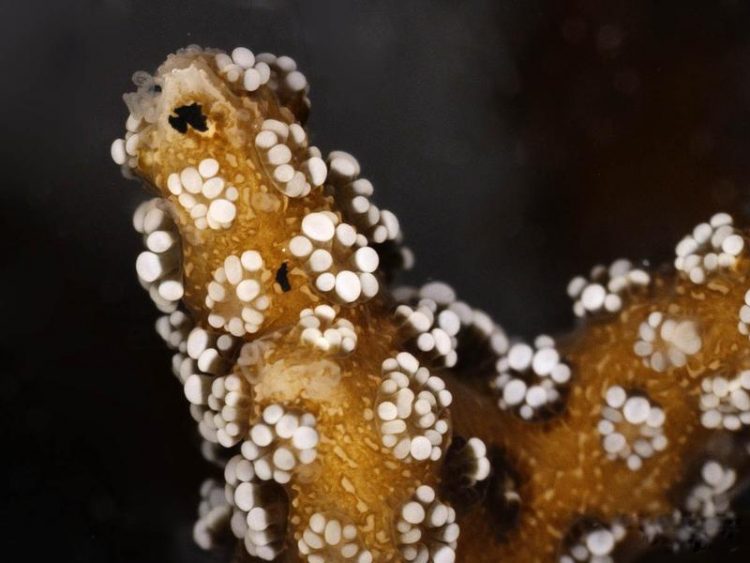When corals eat plastics

Close-up of a coral interacting with microplastics (black particles). Photo: Jessica Reichert
Coral reefs belong to the most diverse habitats on our planet. Thousands of species of fish use corals as shelter, food source and nursery. However, coral reefs are increasingly suffering from the effects of global change.
Alongside rising temperatures, it is the increase in pollution from plastic waste that is having a detrimental impact. Plastic bottles, bags and packaging are present in nearly every reef today. What is not immediately obvious, but is just as prevalent and potentially dangerous, is microplastics – tiny plastic fragments measuring less than five millimetres.
Scientists at Justus Liebig University Giessen (JLU) have now examined the effects of these particles on six widespread species of coral for the first time. Their results have been published in the journal “Environmental Pollution”.
For this study, the scientists exposed corals to increased concentrations of microplastics under laboratory conditions and documented the reactions shown by the corals.
It was observed that corals often interacted with the plastic particles and some even confused them with food. Other corals responded by more frequently producing mucus and showing other forms of rejection.
After four weeks, five of the six species examined displayed initial signs of impaired health such as bleaching and tissue necrosis. Further studies must now show whether negative effects can be registered even under low microplastic concentrations and what longterm effects microplastics have on corals.
“Our study clearly indicates that microplastics are yet another human-made stress factor for corals and that they are very likely to contribute to further deterioration of coral reefs on our planet”, reports Jessica Reichert, the lead author. The study forms part of the “Ocean 2100” project located in Giessen, in which doctoral students from the German-Colombian Center of Excellence in Marine Sciences CEMarin are examining the effects of climate change on reef building stony corals.
Conditions for the year 2100 are simulated in experiment tanks at the Interdisciplinary Research Centre (iFZ) by gradually setting different parameters such as temperature and acidic content of the water to the levels to be expected.
Contact:
Prof. Dr. Thomas Wilke
Animal Ecology and Systematics
Heinrich-Buff-Ring 26-32 (iFZ), D – 35392 Giessen
Tel.: (++49) 641 99-35720
https://www.sciencedirect.com/science/article/pii/S0269749117329536 (Publication)
Media Contact
More Information:
http://www.uni-giessen.de/All latest news from the category: Ecology, The Environment and Conservation
This complex theme deals primarily with interactions between organisms and the environmental factors that impact them, but to a greater extent between individual inanimate environmental factors.
innovations-report offers informative reports and articles on topics such as climate protection, landscape conservation, ecological systems, wildlife and nature parks and ecosystem efficiency and balance.
Newest articles

Innovative vortex beam technology
…unleashes ultra-secure, high-capacity data transmission. Scientists have developed a breakthrough optical technology that could dramatically enhance the capacity and security of data transmission (Fig. 1). By utilizing a new type…

Tiny dancers: Scientists synchronise bacterial motion
Researchers at TU Delft have discovered that E. coli bacteria can synchronise their movements, creating order in seemingly random biological systems. By trapping individual bacteria in micro-engineered circular cavities and…

Primary investigation on ram-rotor detonation engine
Detonation is a supersonic combustion wave, characterized by a shock wave driven by the energy release from closely coupled chemical reactions. It is a typical form of pressure gain combustion,…



